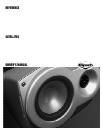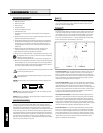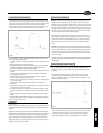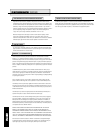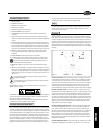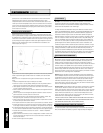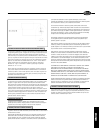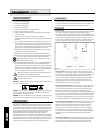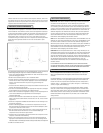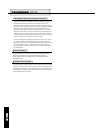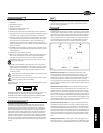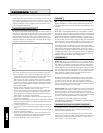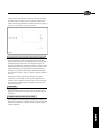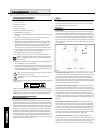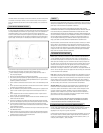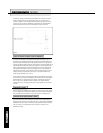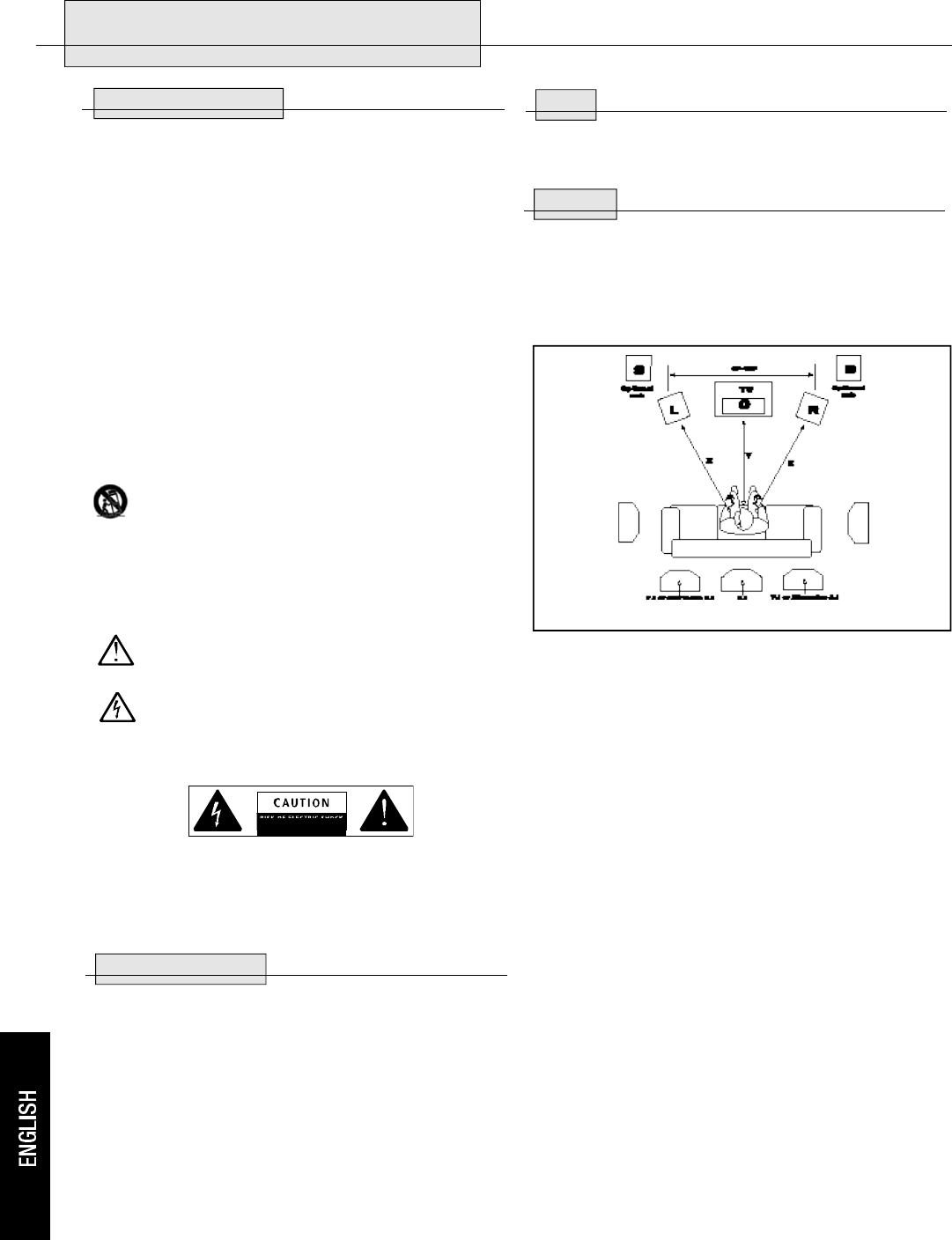
REFERENCE SERIES
IMPORTANT SAFETY INSTRUCTIONS
1. READ these instructions.
2. KEEP these instructions.
3. HEED all warnings.
4. FOLLOW all instructions.
5. DO NOT use this apparatus near water.
6. CLEAN ONLY with dry cloth.
7. DO NOT block any ventilation openings. Install in accordance with the manufacturer's
instructions.
8. DO NOT install near any heat sources such as radiators, heat registers, stoves, or other
apparatus (including amplifiers) that produce heat.
9 . DO NOT defeat the safety purpose of the polarized or grounding type plug.A polarized plug
has two blades with one wider than the other.A grounding type plug has two blades and a
third grounding prong. The wider blade or the third prong are provided for your safety. I f
the provided plug does not fit into your outlet,consult an electrician for replacement of the
obsolete outlet.
10. PROTECT the power cord from being walked on or pinched, particularly at plugs,
convenience receptacles, and the point where they exit from the apparatus.
11. ONLY USE attachments/accessories specified by the manufacturer.
12. USE only with a cart, stand, tripod, bracket, or table specified by the manufacturer, or sold
with the apparatus. When a cart is used, use caution when moving the cart/apparatus
combination to avoid injury from tip-over.
13. UNPLUG this apparatus during lightning storms or when unused for long periods of time.
14. REFER all servicing to qualified service personnel. Servicing is required when the apparatus
has been damaged in any way, such as power-supply cord or plug is damaged, liquid has
been spilled or objects have fallen into the apparatus, the apparatus has been exposed to
rain or moisture, does not operate normally,or has been dropped.
This symbol indicates that there are important operating and maintenance instructions
in the literature accompanying this unit.
This symbol indicates that dangerous voltage constituting a risk of electric shock is
present within this unit.
WARNING: To reduce the risk of fire or electrical shock, do not expose this apparatus to rain
or moisture.
WARNING: Voltages in this equipment are hazardous to life. No user-serviceable parts inside.
Refer all servicing to qualified service personnel.
CAUTION: Changes or modifications not expressly approved by the manufacturer could void the
user’s authority to operate this device.
ABOUT YOUR KLIPSCH PURCHASE
Thank you for your purchase of Klipsch satellite speakers. After reading this manual and
connecting your system, you will hear the result of over 55 years of stringent engineering and
class-leading research and development. Like all Klipsch products,your satellite speakers
feature Klipsch Horn-loaded Technology—the guiding design for the first Klipschorn
®
developed
in 1946 and for every product that has followed. Horn-loading allows your speakers to deliver
high sensitivity, low distortion, flat frequency response and wide dispersion, which translates to
unequaled power, detail and dynamics, the hallmarks of “The Klipsch Sound.” Please be sure to
fill out the warranty card at the back of this manual or online at www.klipsch.com so we are
better able to serve you.Again, thank you for choosing Klipsch and we hope that your speakers
bring life to your music and movies for many years.
RISKOF ELECTRICSHOCK
DONOT OPEN
GRILLE
The speaker can be used with or without its grille in place.The grille attaches magnetically;
you can remove the grille easily by pulling it forward and replace it simply by lining up its
edges with the those of the speaker cabinet.
PLACEMENT
Your Reference Satellite speakers are designed for maximum flexibility and will perform well in
a wide variety of configurations. Figure 1 shows a typical home theater setup, with a center-
channel satellite on top of a TV set, left and right front satellites flanking the screen, another
pair of satellites to the sides of the listening area for the main surrounds, and a third pair
behind for the surround back channel in a 7.1-channel (Dolby Digital EX or DTS-ES) system.
Below are specific placement recommendations for each function.
Center-Channel Speaker: Center the speaker directly above or below your video screen.The
integral stand allows the speaker to be placed on top of the TV (or on a shelf just above or
below it) or mounted on the wall (see wall mounting instructions). Ideally, the speaker’s front
baffle should be flush with the front of the screen. If the speaker is well above or below the ear
height of seated listeners, you can improve performance by angling it slightly up or down to
compensate. See stand adjustment section for more detail.
Front Left and Right Speakers: The front left and right speakers should be approximately in
line with your video screen and equidistant from it. The distance from the screen is not critical,
though wide separation will tend to make the sound more spacious.Avoid having either
speaker closer than 2 feet to a side wall, and if they are on shelves or in a cabinet, place them
so that their fronts are at least flush with the cabinet’s front. Place them at seated ear height,
or, if that is not practical, adjust the stands’ ball joints to aim them up or down toward the
listening position. See stand adjustment section for more detail.
Left and Right Surround Speakers:The best location for satellites employed as surround
speakers is on or against the walls to the sides of the seating area, anywhere from adjacent
to the listening position to about 20 degrees behind it. Mount them above the ear height of
seated listeners (5’-7’ high) but avoid placing them up against the ceiling. Aim them straight
across the room or back slightly toward the rear wall for a more diffuse sound or toward the
listening position for a more direct sound. The design allows great flexibility,however,and good
results can be achieved with configurations that depart significantly from the ideal.
Surround Back Speakers: If your electronics support Dolby Digital EX,THX Surround EX, or
DTS-ES 7.1 or 6.1-channel surround, you can place one or two satellites behind the seating
area to serve as surround back speakers. As with the left and right surrounds, the optimum
location is above seated ear level. If you are using just one back surround speaker,it should
be centered behind the listening area; if you are using two, they should be spaced fairly close
together.With this type of system, the regular left and right surrounds should be located
adjacent to the seating area rather than behind it.
Figure 1
X=Y=Z



